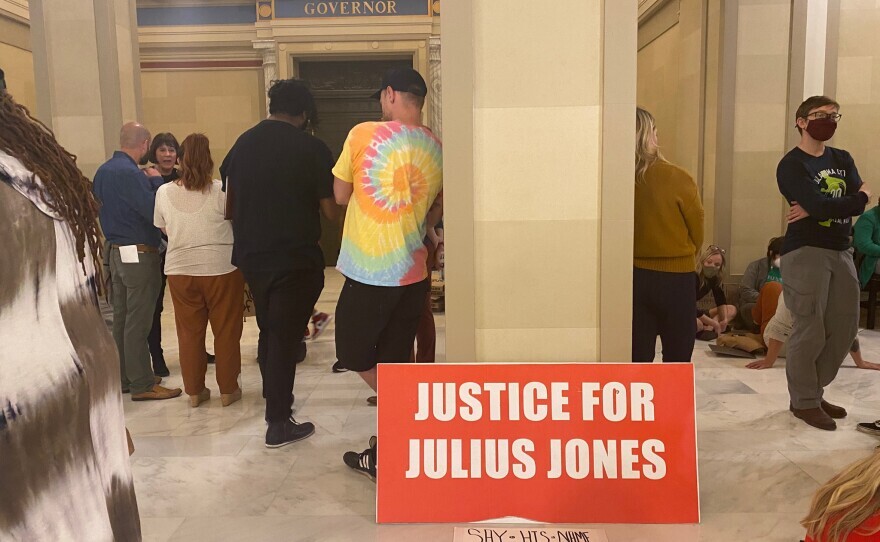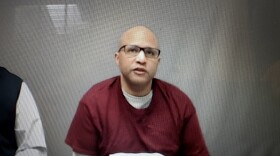Less than 48 hours out from his scheduled execution, Julius Jones’ supporters still don’t know whether he’ll get clemency.
Jones has been on death row for murder for 22 years. His execution is scheduled for Thursday afternoon, despite widespread concerns about whether he committed the crime.
The Pardon and Parole Board recommended commutation, and then clemency, for Jones.
The decision to go through with it is ultimately on Gov. Kevin Stitt, who has not announced his decision as of Tuesday evening. Two of the three votes to recommend clemency for Jones came from board members appointed by Stitt.
Members of Jones' family and supporters were at the state capitol Tuesday and joined each other in prayer.
Two Oklahoma City pastors — John Reed and Derrick Scobey — met with Stitt'sgeneral counsel Trevor Pemberton and chief of communications Charlie Hannema, but not with Stitt himself. They were told Stitt is not publicly meeting with anyone, but is instead praying in solitude about his decision.
"If he’s waiting for a word from the Lord, God says, 'Thou shall not kill,'" said Dr. Marvin Morgan, one of the many pastors who spoke at the state capitol during demonstrations on Tuesday and at a later vigil.
Only pastor Reed and Scobey we’re involved in the meeting and met first with the general council and then the Chief Communications Director.
— Tyreke J. Baker (@TyrekeBakerTBT) November 16, 2021
I help include sound bites from the press conference in a thread below. @TheBlackTimesOK pic.twitter.com/YMFMZK9FXw
Jones’ supporters — including his mother Madeline Davis-Jones — have been gathering for vigils at the Oklahoma History Center — just steps from the governor’s mansion, each night leading up to the scheduled execution.
Davis-Jones tried to meet with Stitt on Monday, but her request was denied.
"I'm going to have to be like Abraham. I know God has everything in place," said Davis-Jones.
Hours before Tuesday night's vigil, Oklahoma City Police Department and Oklahoma Highway Patrol began setting up barricades along the sidewalks on 23rd Street. The department issued a release on Twitter, saying it partnered with the Oklahoma Highway Patrol to create a safe environment for peaceful gatherings.
Bipartisan support for clemency
Jones was convicted and sentenced to death for the 1999 carjacking and murder of Paul Howell.
Former Oklahoma County District Attorney Bob Macy pursued the death penalty against Jones. A 2016 study by Harvard's Fair Punishment Project said that during Macy's 21 years as Oklahoma County's top prosecutor, he sent 54 people to death row, more than any other individual district attorney in the United States.
The report also found that prosecutorial misconduct was cited in many of Macy's cases, and several were tied to disgraced former Oklahoma City police chemist Joyce Gilchrist, who was alleged to have falsified evidence in dozens of cases.
Jones has maintained his innocence. His legal team has said the state’s case against Jones was always weak. They say Jones was given an inadequate defense at trial, and they've uncovered new evidence pointing to his innocence.
Their evidence includes statements from three prisoners who claim Jones’ codefendant confessed while behind bars to murdering Howell and framing Jones.
Several Democratic state lawmakers, including Jason Lowe, Regina Goodwin, Monroe Nichols, Mauree Turner, Emily Virgin, Forrest Bennett and John Waldron, have called for Stitt to grant Jones clemency.
"The legal standard in the state of Oklahoma for the death penalty is ‘beyond a reasonable doubt,'" said Lowe earlier this month. "This case has nothing but doubt. It is filled with doubt."
Last week, five Republican state lawmakers — Kevin McDugle, Garry Mize, Preston Stinson, Logan Phillips and John Talley — joined the chorus of people urging clemency for Jones.
"If we believe, as conservatives, in law and order and the criminal justice system, then we have to make sure the system is getting it right," said Talley. "In this case, the Pardon and Parole Board spent several hours looking at the case, during two separate hearings, and determined that it may not have. We should not execute a man in that context."
State schools Superintendent and Republican-turned-Democratic gubernatorial candidate Joy Hofmeister told The Oklahoman on Tuesday that if she were in Stitt's position, she would grant Jones clemency.
Jones' case was featured in a 2018 ABC docuseries and has garnered national attention and support of criminal justice advocates and high-profile celebrities like Kim Kardashian, actors like Kerry Washington and professional athletes like Blake Griffin, Russell Westbrook, Trae Young, Buddy Hield and Baker Mayfield.
According to The Associated Press, the last time an Oklahoma governor granted clemency to a death row inmate was Brad Henry in 2010. Former Governor Mary Fallin denied three separate recommendations by the board for clemency for death row inmates.A torturous history
Oklahoma's last several executions have been gruesome and filled with protocol violations.
Last month, in the state's first execution since 2015, John Grant convulsed and vomited repeatedly after being administered the three-drug cocktail.
Executions had been on pause in Oklahoma following the near-execution of Richard Glossip in 2015, and the botched lethal injections of Charles Warner in 2015 and Clayton Lockett in 2014.
Glossip was scheduled to die in September 2015. Then-Oklahoma Gov. Mary Fallin issued a last-minute stay of execution for Glossip when it was discovered the Department of Corrections received a shipment of potassium acetate instead of potassium chloride, as required in the state's execution protocol.
An autopsy report revealed the state used the wrong drug — again, potassium acetate — to execute Warner in January 2015. According to witnesses, Warner said, "It feels like acid," and "My body is on fire" while being given the three-drug cocktail.
Lockett's April 2014 execution was also botched. A report issued after his death found that after trying for 51 minutes to find a vein, a phlebotomist misplaced the IV line intended to deliver the lethal cocktail of drugs directly into Lockett's bloodstream. Instead, the cocktail was delivered to the surrounding tissue.
Lockett writhed on the gurney and mumbled before being pronounced dead 43 minutes after the procedure began. An investigation later revealed that the faulty insertion of the intravenous line and lack of training of the execution team contributed to the problems.
In January 2014, Oklahoma executed Michael Lee Wilson by lethal injection. Shortly after his execution started, Wilson's final words were, "I feel my whole body burning."
This report was produced by the Oklahoma Public Media Exchange, a collaboration of public media organizations. Help support collaborative journalism by donating at the link at the top of this webpage.














